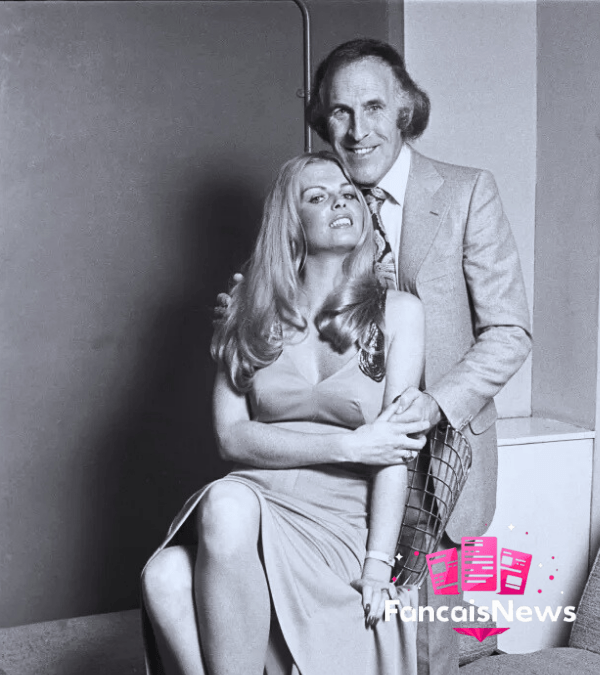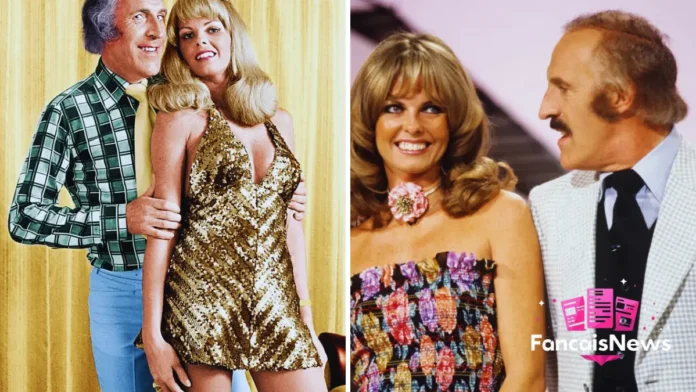Introduction
There are some faces in British television history that instantly evoke an era, a mood, even a style of entertainment. For many who grew up in the 1970s, Anthea Redfern was one of those faces. With her elegant gowns, warm smile, and graceful presence on The Generation Game, she became an icon of glamour in living rooms across the nation. Yet, behind the lights and applause, there was a woman carving her own path — navigating ambition, love, reinvention, and the quiet spaces in between.
This is not just the story of a TV hostess. It’s the portrait of a woman who lived at the crossroads of British showbusiness and personal discretion, someone who knew how to step into the spotlight when it counted and step back when the moment passed.
Early Life and Modelling Career
Long before the television cameras found her, Anthea was a young woman with a sense of style that seemed to belong on glossy magazine covers. She was born into a Britain that was shifting from post-war formality into the cultural openness of the 1960s — a decade when hemlines rose, fashion houses thrived, and modelling became a passport to a wider world.
She began her journey in the modelling world with more determination than fanfare. No instant stardom, no overnight headline — just the careful, persistent building of a portfolio, the rehearsed poise before a camera, the knowledge that each runway appearance was another chance to be noticed. Soon enough, her tall frame, graceful posture, and camera-ready features began to set her apart.
Rise to Fame on The Generation Game
How She Got the Role
Television in the 1970s was a different kind of stage. There were fewer channels, but the reach was far greater — and getting the call to join a BBC primetime programme was a career-defining moment. For Anthea, the leap from fashion shoots to The Generation Game came with an audition that required more than just looks. A hostess needed warmth, timing, and the ability to glide between contestants, cameras, and a quick-witted host.
She had all three. The producers saw it instantly, and so did Bruce Forsyth, the show’s charismatic frontman.
The Glamorous Hostess
Once on screen, Anthea didn’t just stand beside the prizes — she became part of the show’s rhythm. Her rapport with Bruce Forsyth created an atmosphere that felt both polished and spontaneous. She wasn’t merely presenting objects; she was part of the entertainment tapestry — the calm in the middle of the game’s chaos, the person who could make contestants relax with a single smile.
In living rooms across Britain, her evening gowns and poised presence became as familiar as the show’s catchphrases.
Relationship with Bruce Forsyth

What began as professional chemistry evolved into a romance that the press followed with relish. Anthea and Bruce became one of television’s golden couples, photographed at premieres, charity functions, and social events.
Their relationship was lived, at least in part, in the public eye — a challenge for any couple, particularly when both halves are under constant media watch. They married, and for a time, the public saw them as an embodiment of the era’s television glamour. Yet, balancing personal life with the pace of broadcasting was no small feat, and their relationship eventually moved into separate chapters.
Life Beyond The Generation Game
Leaving the show was not the end of Anthea’s public life, but it marked a shift in tone. Without the weekly platform of the BBC stage, she explored other avenues: guest appearances, presenting work, and ventures outside broadcasting.
She became a familiar face at charity events and business functions, but she chose her appearances selectively. Rather than chase relentless media coverage, she carved out a space where her name still carried weight but her private life remained hers to guard.
Personal Life and Family
Away from cameras, Anthea’s life was shaped by family, friendships, and personal pursuits. While her public image was tied to high glamour, her private world allowed for quieter routines — time spent with loved ones, the comfort of close-knit circles, and moments where the world was not watching.
She embodied the ability to separate work and home at a time when television personalities were often expected to live as open books for their audience.
Reinvention and Later Years
The ability to reinvent oneself is often underrated. For Anthea, the later chapters of her life were about shaping her own narrative rather than letting the press do it for her. She stepped away from constant television exposure, yet she never truly disappeared from the cultural memory of British entertainment.
Whether appearing at special events, giving the occasional interview, or supporting charitable causes, she retained the poise that first made her a star. The difference was that now, she dictated the terms.
Legacy and Cultural Impact
To understand Anthea Redfern significance, you have to picture the landscape of British television when she first appeared. Female hosts were still relatively rare on primetime game shows, and those who succeeded did so with skill, warmth, and an instinct for live entertainment.
She set a precedent for the hostess role to be more than ornamental — a figure who could be graceful, engaging, and central to the show’s identity. For many viewers, she remains inseparable from The Generation Game’s most fondly remembered era.
Why Anthea Redfern Still Captivates the Public
In an age of constant social media updates, Anthea Redfern enduring fascination comes partly from what we don’t know. She represents a kind of celebrity that belongs to another time — one where mystique was part of the appeal.
People remember the gowns, the voice, the rapport with Bruce. They remember watching her on a Saturday evening with family gathered around. And because she never overshared, there’s still room for curiosity, decades later.
Conclusion
Anthea Redfern story is more than a sequence of television appearances and public events. It’s about navigating fame on her own terms, knowing when to step forward and when to retreat, and leaving behind a legacy built on grace rather than noise.
From a young model chasing opportunities, to the poised hostess who became part of a national Saturday night tradition, to the woman who learned the art of reinvention — hers is a career and a life that still commands respect.
FAQ: Anthea Redfern
Who is Anthea Redfern?
A British television personality and former model, best known as the hostess on The Generation Game in the 1970s.
When was Anthea Redfern on The Generation Game?
She appeared during the show’s early and most celebrated years in the 1970s.
Was Anthea Redfern married to Bruce Forsyth?
Yes, she was married to the show’s host, Bruce Forsyth, during part of her time on the programme.
What did Anthea Redfern do after television?
She pursued selective media appearances, charity work, and personal ventures, maintaining a lower public profile.
Where is Anthea Redfern now?
She keeps a private life, occasionally appearing for special events or interviews.
Why is Anthea Redfern remembered fondly by TV audiences?
For her elegance, warmth, and the way she became an integral part of one of Britain’s most beloved game shows.

